

Magic Mushrooms Promote Positive Processing of Emotions. By JordanThe Spirit Science I found an article recently that depicted some absolutely incredible information!
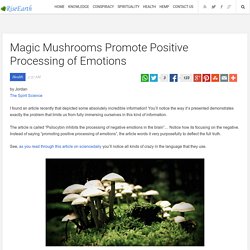
You’ll notice the way it’s presented demonstrates exactly the problem that limits us from fully immersing ourselves in this kind of information. The article is called “Psilocybin inhibits the processing of negative emotions in the brain”… Notice how its focusing on the negative. Instead of saying “promoting positive processing of emotions”, the article words it very purposefully to deflect the full truth. Psilocybin inhibits the processing of negative emotions in the brain. Emotions like fear, anger, sadness, and joy enable people to adjust to their environment and react flexibly to stress and strain and are vital for cognitive processes, physiological reactions, and social behaviour.
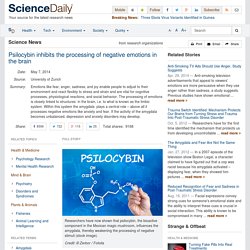
The processing of emotions is closely linked to structures in the brain, i.e. to what is known as the limbic system. Within this system the amygdala plays a central role -- above all it processes negative emotions like anxiety and fear. If the activity of the amygdala becomes unbalanced, depression and anxiety disorders may develop. Medicinal Mushrooms. Microscopic Interests. Mushroom Vaults : Cultivation Tips.
My Cology. Ethnobotany. Plant Guides. Medica. Shaman Guides. Mystic Crystal Revelation. New Health Concerns. Entheogenic Review. Exogenous Amina. Peyote Wisdom. List of kampo herbs. The 14th edition of the Japanese Pharmacopoeia (JP) (日本薬局方 Nihon yakkyokuhō) lists 165 herbal ingredients that are approved to be used in kampo remedies. [2] The following are the most common herbs used in kampo medicines.
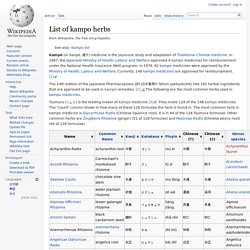
Tsumura (ツムラ) is the leading maker of kampo medicine [3]. They make 128 of the 148 kampo medicines. The "count" column shows in how many of these 128 formulae the herb is found in. The most common herb in kampo medicine is Glycyrrhizae Radix (Chinese liquorice root). List of herbs with known adverse effects. This is a partial list of herbs and herbal treatments with known or suspected adverse effects, either alone or in interaction with other herbs or drugs.

Non-inclusion of an herb in this list does not imply that it is free of adverse effects. In general, the safety and effectiveness of alternative medicines have not been scientifically proven[1] and remain largely unknown.[2] Beyond adverse effects from the herb itself, "adulteration, inappropriate formulation, or lack of understanding of plant and drug interactions have led to adverse reactions that are sometimes life threatening or lethal.
"[3] Most of the adverse effects stated in this list are associated with only a small percentage of cases; they should be understood as potential risks rather than as certainties. §Herbs, treatments, and constituents with known or suspected adverse effects[edit] §Herbs with adverse drug interactions[edit] §[edit] Les Champignons... The True Hallucinogens. Twelve Constellations of the Girdle of Gaia "The Tree of Life bears twelve manner of monthly fruit and the leaves are for the healing of the nations"- Revelation.
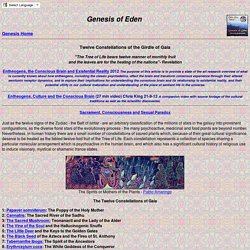
A Journey into Herbal & Natural Healing. Organic is always the best, right?
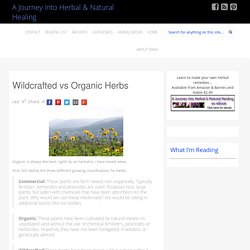
As an herbalist, I have mixed views. First, let’s define the three different growing classifications for herbs. Commercial: These plants are farm raised, non-organically. Typically fertilizer, herbicides and pesticides are used. Produces nice, large plants, but laden with chemicals that have been absorbed into the plant. Organic: These plants have been cultivated by natural means on unpolluted land without the use of chemical fertilizers, pesticides or herbicides. Medicinal Plants of India ; Ayurveda. Medicinal Plants. Plantes Sauvages - Base de données.
Legendary Herbs - Ginseng, Chinese Herbs, and Granules. Cap 549 Sched 2 CHINESE HERBAL MEDICINES (CHINESE MEDICINE ORDINANCE) Ayurveda: Ayurvedic Herbology. One of the main methods of treatment in Ayurvedic medicine is through the healing properties of plants and other substances.
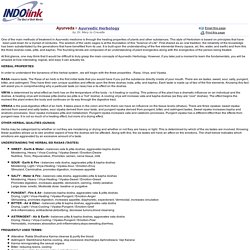
Pharmacographia indica. A history of the princi... Ayurvedic Herb Spreadsheet. Magic mushrooms expand your mind and amplify your brain’s dreaming areas – here’s how. Psychedelic drugs alter consciousness in a profound and novel way that increases the breadth and fluency of cognition.
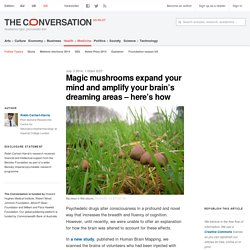
However, until recently, we were unable to offer an explanation for how the brain was altered to account for these effects. Paan. This article is about the chewing parijat.
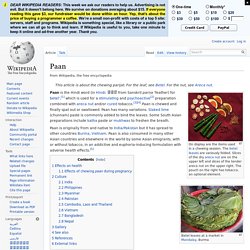
For the leaf, see Betel. For the nut, see Areca nut. On display are the items used in a chewing session. Book Review: Herbal Medicines, Third Edition (2008) Book Review: Herbal Medicines, Third Edition (2008) This beautifully written 720-page guide is intended primarily for health professionals, but its main points are understandable by laypersons.
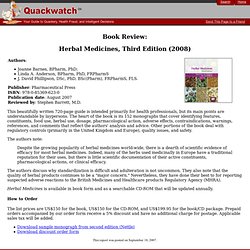
Salvia Divinorum: Key to the Multiverse? One of the most commonly occurring phenomena that I experience while in Salvia Space, is variations on multiple images of reality, of the room I am meditating in. (I have become able to experience eyes-open visions that interact with actual reality after a lot of practice resisting the very powerful "pull" of the drug as it is taking effect.) I've seen multiple images of the room "displayed" as a giant rolling "rolodex" of images. Imagine a very thick book, each page showing a view of the room as seen from my eyes, with the ends (first and last pages) bent around to touch each other, forming a wheel of multiple views, turning slowly on it's horizontal axis or "spine.
" Medicinal mushrooms. Lepista nuda Medicinal mushrooms are mushrooms used in medicine or medical research. History[edit] Ganoderma cultivation (left, Hokkaido) Cordyceps store (right, Lhasa) Mushrooms, fermentation molds, mycelia, sclerotium, and lichens, have a history of medicinal use spanning millennia. Magic mushroom’s positive effects lasting over a year, say researchers. By Eric W. DolanWednesday, June 15, 2011 16:45 EDT Scientists at the Johns Hopkins University School of Medicine claim to have determined the proper dose levels needed to create positive changes in attitudes, mood, life satisfaction, and behavior that persist for more than a year with the psychoactive substance in so-called “magic mushrooms.”
The findings are the latest in a series of experiments done at Johns Hopkins to investigate psilocybin, a psychedelic substance contained in certain mushrooms. Want to Feel Younger, More Open? 'Magic Mushrooms' Trigger Lasting Personality Change. The psychedelic drug psilocybin (the active ingredient in “magic mushrooms”) may produce lasting, positive changes in personality, new research finds. People who took the drug showed increases in the key personality dimension of openness — being amenable to new ideas, experiences and perspectives — more than a year later. “It was sort of like an anti-inflammatory for the ego,” says Brian, a 50-year-old scientist, who participated in the research (he declined to reveal his last name). “The swelling went down and I got to see what was underneath.”
Researchers led by Katherine MacLean, a postdoctoral student at Johns Hopkins University, analyzed personality data on 52 participants (average age 46) who had participated in the group’s earlier research on the drug. These volunteers took psilocybin during two to five sessions, at various doses, under highly controlled conditions at the hospital. MORE: ‘Magic Mushrooms’ Can Improve Psychological Health Long Term. Mycotopia.net web forums. Psilocybin Advanced Cancer Anxiety Study. Magic Mushrooms may have Cure for Depression. ‘Magic Mushrooms’ Cause Positive Personality Change. New research from Johns Hopkins School of Medicine indicates that the psychedelic component in magic mushrooms may have lasting medical and spiritual benefits to psychological health. The mushroom-derived hallucinogen, called psilocybin, is known to cause transformative spiritual states, but at high doses it can also bring about “bad trips” marked by terror and panic.
The trick is to get the dose just right, which the Johns Hopkins researchers report having accomplished. In their study, the Hopkins scientists were able to reliably induce transcendental experiences in volunteers, which offered long-lasting psychological growth and helped people find peace in their lives — without the negative effects. Medicinal Mushrooms. Research. By Michael Barreto, Ph.D. Lion's Mane: A Mushroom That Improves Your Memory and Mood? Mushrooms provide a vast array of potential medicinal compounds. What is Jiaogulan? Jiaogulan (Gynostemma pentaphyllum), is a plant that grows wild in China, as well as many other countries throughout Asia.
In China, it has been used for many years as a medicinal and energizing tea in the local regions where it grows. Jiaogulan is sometimes called "Southern Ginseng", since it grows in south central China and because of its similarity to ginseng in chemical composition and function. Adventures with Mazatec Mint: Exploring the Mind-Bending World of Salvia Divinorum. This article originally appeared in High Times magazine. Tricho Serious Ethnobotany~*
How to Grow Calea Zacatechichi from Seeds and Cuttings « worldseedsupply.org. Phalaris arundinacea - RoguesGallery. Legend for Species Pages. Sacred Narcotic Water Lily of the Nile by William A. Emboden Jr., Ethnobotany, Entheogens, Egypt, Drugs in Antiquity. By William A. What is Jiaogulan? Dosing, Side Effects & More. Jiaogulan. History of Jiaogulan - Chapter II from Jiaogulan "China's Immortality Herb" by Michael Blumert Traditional Uses Although jiaogulan grows in many Asian countries, there does not seem to be any early historical documentation in existence other than in China. Jiaogulan professional information from Drugs. Drug-Digest-Jiaogulan. Jiao-gu-lan, Japanese* (Gynostemma pentaphyllum), 3 potted plants, organic, discounted. The Immortalitea Company, Specializing in Jiaogulan (Gynostemma), Mulberry Leaf and Oolong Whole Leaf Teas. JIAOGULAN: Uses, Side Effects, Interactions and Warnings.
Discover Jiaogulan's side effects from 30+ years of study. The Lies of Jiaogulan (Gynostemma pentaphyllum) Sceletium tortuosum. Scelettort. Kanna (Sceletium tortuosum) Vault. Neuropsychopharmacology - Acute Effects of Sceletium tortuosum (Zembrin), a Dual 5-HT Reuptake and PDE4 Inhibitor, in the Human Amygdala and its Connection to the Hypothalamus. Sceletium.Org - Information and links on Sceletium tortuosum. MAPS Media Archive Ibogaine - Exploring the New Frontier of Psychedeli (...) IbogaLife The Wood Is Good.
MindVox Ibogaine Archives. My Experience with a Psychedelic Plant That Thousands Have Used for Re (...) Awakening in the Dream House-Integrative Ibogaine Addiction Therapy. Ibogaine Outcome Study A Progress Report on the Iboga Therapy House. EntheO. The Medicines.